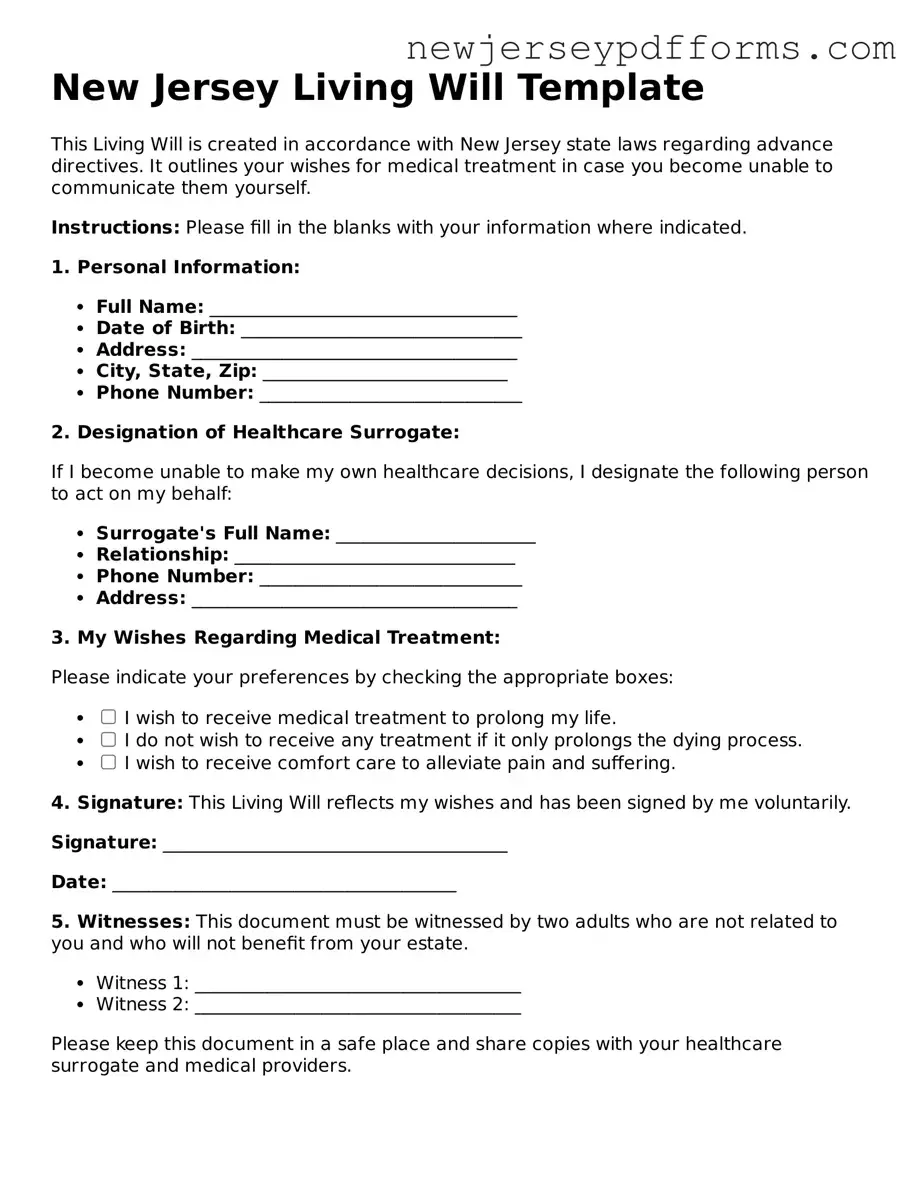The New Jersey Advance Directive for Health Care is closely related to the Living Will form. This document allows individuals to specify their healthcare preferences and appoint a proxy to make decisions on their behalf if they become unable to communicate. Like the Living Will, it addresses end-of-life care but also includes provisions for appointing a healthcare representative, providing a more comprehensive approach to personal health decisions.
The Durable Power of Attorney for Health Care is another document that serves a similar purpose. This form enables a person to designate an agent to make healthcare decisions for them if they are incapacitated. While the Living Will outlines specific treatment preferences, the Durable Power of Attorney gives the appointed agent the authority to make decisions based on the individual's values and wishes, allowing for flexibility in unforeseen circumstances.
The Health Care Proxy is similar to both the Living Will and the Durable Power of Attorney. This document allows individuals to appoint someone to make medical decisions on their behalf. While the Living Will focuses on specific medical interventions, the Health Care Proxy grants broader decision-making authority, ensuring that a trusted person can act in accordance with the individual’s wishes when they cannot do so themselves.
The Do Not Resuscitate (DNR) Order is another document that complements the Living Will. A DNR order specifically instructs medical personnel not to perform cardiopulmonary resuscitation (CPR) in the event of cardiac arrest. While the Living Will may cover a range of medical treatments, the DNR focuses solely on resuscitation efforts, making it a critical component of end-of-life care planning.
The Physician Orders for Life-Sustaining Treatment (POLST) form is similar in that it translates a patient’s preferences into actionable medical orders. Unlike the Living Will, which is often a general statement of wishes, the POLST form provides specific medical orders that healthcare providers must follow. This document is particularly useful for individuals with serious health conditions who want to ensure their treatment preferences are honored immediately.
The Mental Health Advance Directive allows individuals to outline their preferences regarding mental health treatment. This document is akin to the Living Will but focuses specifically on mental health care. It can include instructions on medication preferences and crisis intervention strategies, ensuring that individuals receive care that aligns with their values during mental health crises.
The Organ Donation Consent form is another relevant document. While the Living Will addresses end-of-life care, the Organ Donation Consent form specifies an individual’s wishes regarding organ donation after death. This form ensures that a person’s intent to donate organs is clearly communicated, which can save lives and provide comfort to families during difficult times.
The Surrogate Decision-Maker form is similar to the Health Care Proxy. It designates an individual to make healthcare decisions when someone is unable to do so. This document is particularly useful in situations where a person has not appointed a healthcare proxy, ensuring that there is a trusted individual who can make decisions in line with the patient’s values and wishes.
The End-of-Life Care Plan is another document that shares similarities with the Living Will. This plan allows individuals to detail their preferences for care in the final stages of life. It encompasses a broader range of considerations, including spiritual, emotional, and physical care, providing a holistic approach to end-of-life planning.
Lastly, the Family Medical Leave Act (FMLA) documentation may also be considered in conjunction with the Living Will. While not a direct counterpart, FMLA allows employees to take time off to care for family members with serious health conditions. Understanding how these documents interact can help individuals navigate complex healthcare and family situations effectively.

